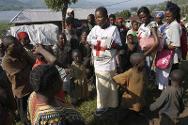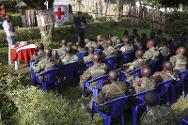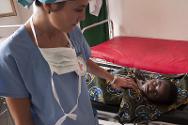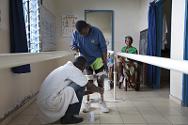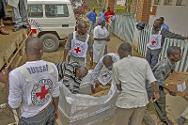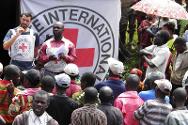Democratic Republic of the Congo: Communities in fear and uncertainty
20-08-2013 Operational Update
While the outcome of diplomatic, military and political initiatives currently under way remains uncertain, the humanitarian and security situation in the east of the Democratic Republic of the Congo continues to be a major concern. The presence of numerous uncontrolled armed groups is still causing massive displacements of people fleeing hostilities and abuse. As a consequence, there is a critical need to protect civilians and to ensure that they have access to health care, water, food and other basic necessities.
Over the past month, fighting has continued between armed forces and groups in both North and South Kivu, in particular in the territories of Niyragongo, Masisi and Beni in North Kivu, and on the Ruzizi plain and in Shabunda Territory in South Kivu. Fighting erupted recently around the city of Baraka in Fizi Territory, South Kivu, and also in the Ituri and Tshopo districts of Eastern Province.
The ICRC has been adapting its response to a very volatile environment in order to meet the needs of conflict victims in the best way possible and to overcome problems of access. "Communities in the most unstable areas of eastern Democratic Republic of the Congo live in constant fear. Some are even forced to move away to escape the fighting, threats and looting," said Alessandra Ménegon, head of the ICRC delegation in the country. "Our staff remain on the ground, close to the hardest-hit communities. Civilians are suffering many kinds of trauma, both physical and psychological."
Wounds that take long to heal
Two ICRC surgical teams are carrying on with their work together with the staff of NDosho Hospital in Goma, North Kivu, and of the provincial general referral hospital in Bukavu, South Kivu. Serious war injuries often require specialized surgical procedures spanning a number of weeks or even months. In some cases, physical rehabilitation and psychological support need to be provided. Since the beginning of July, 66 war-injured civilians and military personnel have been admitted to the two hospitals, where more than 250 operations have been performed.
Providing food, household items and seed
In its aid activities, the ICRC takes into account the fact that the local families that take in people who have had to flee their villages, whether because of fighting or as a precautionary measure, are often economically vulnerable. In Masisi Territory, North Kivu, for example, 18,000 displaced people and their host families were given food, household essentials and potato seed.
When displaced people return to their home villages, after losing everything, they often have to contend with great hardship. The ICRC strives to help them regain the ability to earn a living without outside help. In Shabunda Territory, South Kivu, it provided food and essential supplies for 23,000 people who had returned to their homes in order to help them get back on their feet. In the Bafwasende district of Eastern Province, it provided more than 5,200 people with tools and vegetable seed. Volunteers from the Red Cross Society of the Democratic Republic of the Congo played an active role in distributing the aid.
Raising awareness of the rules of customary international humanitarian law
In awareness-raising sessions, ICRC staff in the field endeavour to persuade members of armed forces and groups to respect civilians. Over the past two months, information sessions on international humanitarian law have also been held for new battalions of the United Nations Organization Stabilization Mission in the Democratic Republic of the Congo (MONUSCO).
At participatory meetings with some communities in the Kivus, the ICRC provides information on counselling centres ("maisons d'écoute") that offer psychological help for victims of acts of violence, especially sexual violence. The ICRC supports some 40 such centres in the Kivus.
The ICRC also collects information on violations of international humanitarian law such as acts of sexual violence and child recruitment. It shares any information of this kind directly and confidentially with the armed forces or groups involved. The aim is to bring about changes in the way weapon bearers behave towards civilians and people not taking part in hostilities.
Since the beginning of July, the ICRC has also:
- continued its visits to people in some 30 prisons and other places of detention, both civilian and military, in particular in Eastern, Katanga, Western Kasai and Eastern Kasai provinces, and in Kinshasa;
- brought daily food aid to some 3,100 people held in nine prisons;
- supplied medicines, wound-dressing materials and plasma substitutes for treating the injured to Katindo Hospital in Goma and in Rutshuru Territory, North Kivu;
- provided two health-care centres in the Kamango area, Beni Territory, northern North Kivu Province, with enough medical supplies to treat up to 2,000 patients for three months in order to enable the centres to cope with the increase in medical needs arising from the recent influx of displaced people fleeing fighting;
- reunited, in cooperation with Congolese Red Cross volunteers, 46 children with their relatives, with whom they had lost contact owing to the fighting. Twelve of the children had been recruited into armed forces or groups;
- presented a master plan for the water network in Bukavu, South Kivu, to the provincial authorities, financial donors and other interested organizations in order to obtain their support for improvements in the water supply for city inhabitants;
- continued an assessment of the humanitarian situation of people displaced in Manono Territory, in the centre of Katanga Province.
For further information, please contact:
Annick Bouvier, ICRC Kinshasa, tel: +243 81 700 85 36
Thomas Glass, ICRC Goma, tel: +243 81 700 77 86
David-Pierre Marquet, ICRC Geneva, tel: +41 22 730 25 02 or +41 79 536 92 48
